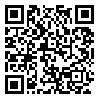BibTeX | RIS | EndNote | Medlars | ProCite | Reference Manager | RefWorks
Send citation to:
URL: http://rjms.iums.ac.ir/article-1-3954-en.html
Background: The junk food consumption is current between students. As this consumption pattern continue in adulthood and is related to appearance of chronic disease, so the present study examined the impact of education on the basis of the theory of planned behavior on junk food consumption among male students in level 8 in 2015 in Chenaran. Methods:This survey was a quasi-experimental study with participating 50 male students in level 8 in Chenaran were randomly selected and divided in to control and test groups. Data were gathered through using a questionnaire. Variables were evaluated before and immediately and 1 months after intervention. Finally, the data were analyzed by spss statistical software (version 18)and descriptive and analytical tests. Results: After intervention there was decrease in junk food consumption, there fore there was significant difference in control group before and after intervention. There fore before intervention 20% of students were in low- consumption group, 56% in middle- consumption group and 24% in high - consumption group, since after intervention 64% of students are in low- consumption group, 20% in middle- consumption group and 16% in high - consumption group. There were no significant differences between two group regarding constructs of TPB in the pretest period. However after intervention significant change in awareness score (from 4.72±2.48 to 6.40±2.29),(p‹0.001), subjective norms(from 10.56±2.87 to 13.36±3.98),(p=0.001), perceived behavioral control (from 14.88±3.19 to 17.24±3.13),(p=0.001) and intention(from 6.12±1.42 to 7.24±2.24),(p=0.004), was seen in intervention group. But there was no significant change in the attitude score. Conclusions: Due to the high consumption of junk food in between students and effectiveness of educational interventions of this study in decrease junk food consumption , so implementing educational interventions based on theories especially of planned behavior is essential.





